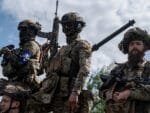The relationship between Serbian President Aleksandar Vučić and Milan Radoičić, a figure with alleged ties to organized crime, has evolved over the years and drawn considerable scrutiny. Initially, Vučić praised Radoičić and others for their role in “protecting” Serbia in Kosovo, directly mentioning Radoičić’s name in a statement back in 2017. However, Vučić’s stance appeared to shift in 2018 when he claimed not to know Radoičić personally, despite Radoičić’s rising prominence within the Serb List, a political party. Vučić later described Radoičić as a crucial figure in defending northern Mitrovica and the Serb people against Albanians, a statement that highlighted Radoičić’s significance in the area.
Critics and observers have pointed to a complex web of connections between Vučić, Radoičić, and criminal activities, especially in the context of Kosovo. A lawyer from Belgrade described a synergy between Belgrade’s institutions, security services, and Radoičić’s operations on the ground. This synergy allegedly supports parallel structures in northern Kosovo, relying on funds from Belgrade and enforcing loyalty to Radoičić and the Serbian List through financial and other means. Those resisting this influence face severe repercussions, underscoring the extent of control and intimidation exercised by Radoičić and his allies.
Vučić has publicly defended Radoičić, even when Radoičić appeared in a video message with threatening tones towards Serbs in Kosovo. Vučić downplayed Radoičić’s actions, suggesting they were a private matter and unrelated to the state of Serbia. This defense came despite Radoičić’s involvement in a meeting of the Serbian Security Council, which was perceived as threatening towards Kosovo.
The international community, including the United States, has taken steps against Radoičić and his associates by imposing sanctions. These measures aim to combat organized crime and its detrimental effects on the Western Balkans’ stability and rule of law. In response to these sanctions, Vučić denied any financial ties between Radoičić’s activities and the Serbian Progressive Party (SNS), which he leads. He insisted the party’s finances were secured through state funds and membership fees, dismissing the need for external contributions.
Further complicating the picture, a New York Times article discussed Vučić’s suspected ties to organized crime, indicating a broader pattern of connections between Serbian political leadership and criminal elements. This scrutiny reflects growing concerns about governance, rule of law, and the entanglement of politics with illicit activities in Serbia and the wider region.







